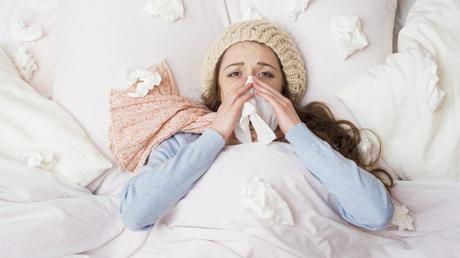
Intimacy and physical contact are things humans need to survive, and yes that includes a little action between the sheets. Has it been a while since you've done the deed? Maybe you and your partner have lost a bit of the spark in your love life. Or maybe you're newly single or simply don't have the time to date. It's also possible you're just focused on other things in your life and don't feel like you're missing anything b not having sex.
Regardless of the reason behind the lack of lovemaking in your life, if you've noticed any sudden changes in your mood or your body, it might be about time to get back in the game. It turns out not having sex can actually cause some changes in your body and, sure, some of the changes you experience might be pretty pleasant, but we can tell you for certain that the vast majority of them aren't. Here's what you can probably expect to happen if making love has taken a backseat in your life.
You might have a wet dream or two

Like an over-hormonal teenage boy, women who aren't having sex regularly may find that their body will remind them what they're missing in their sleep. That's right, we're talking about what teenage boys might call a wet dream. This is especially likely to happen if your sex life is not only at a standstill, but you've also given up on masturbating.
Researchers had it easy when they were studying nocturnal emissions in men, the most obvious reason being because men have erections that are visible and ejaculate as proof that they've climaxed. With women, studying these night time bouts of arousal was more complex.
For researchers to collect data on female arousal during their sleep, they had to measure heart rate, do brain scans, and watch for temperature jumps near the clitoris. While it wasn't easy, they managed to get it done and later revealed in a study reported by Broadly that 37 percent of women will have a wet dream before the age of 45 and that they're most common in women between the ages of 40 and 50. So, if it's been a while since you've gotten lucky, you can expect these little presents to find their way into your subconscious.
Your stress levels go through the roof

According to Psychology Today, the endorphins released during sex are ideal for leaving your worries behind and putting an instant smile on your face. So when you've gone a while without any nookie, you might notice that your stress level builds up.
If you're not one to get off as often as you'd like, have no fear! It's not only those endorphins that help reduce stress levels, it's those acrobatic moves we try in the bedroom as well. Sex can be a form of exercise, which we all know fights off stress and anxiety, so if you aren't getting any these days, try not to skip your cardio workouts.
If it wasn't bad enough that without sex you're feeling overstressed, you might also have high blood pressure. One study determined that those who had sex over a two week period had significantly lower blood pressure levels than those who were without sex or even compared those who masturbated or participated in sexual activities that excluded intercourse. So even taking care of things yourself or making out a bit won't help your stress levels very much. In this case, women actually do need a partner.
Your immune system suffers

Seems like having sex provides some key benefits to our health, but when we're not rolling around in the sheets with our partner, we actually more susceptible to illness too. According to the Mayo Clinic, the DHEA, or Dehydroepiandrosterone, hormone is released during arousal, with even more released when you orgasm. This hormone gives your immune system a bit of a boost, helping your body to fight against bacteria, viruses, and other pretty nasty germs.
While not having sex certainly doesn't mean you're going to come down with some major illness, you'll be missing out on some of these other great benefits as well. The DHEA hormone is also said to act as an antidepressant, make your skin look great, help repair any damaged skin tissue faster, and even increase apprehension and learning abilities.
A study of college students also found higher levels of immunoglobulin A, an antibody that is important for immune function, in those who had sex at least once or twice a week when compared to those who didn't. So, no sex means no antibody to fight off that flu!
You feel depressed

Apparently semen is the new antidepressant. That sounds like something a guy would say to get a girl in bed, but it's true! Psychology Today reported on a study in which 293 SUNY Albany female students were surveyed on their sex habits, such as frequency and whether or not they used a condom. They then gave the same women the Beck Depression Inventory to determine their moods and level of depression.
It turns out that those who were having sex without a condom were significantly less depressed than those who were using condoms or not having sex at all. When the mood elevating compounds found in semen are absorbed by the vaginal walls, they can literally cheer a woman up. Who knew?!
A break in sexual intercourse is also often due to a breakup, which can cause depression on its own. Dr. Lauren Streicher, author of Sex Rx: Hormones, Health, and Your Best Sex Ever explains, "You might be depressed because your boyfriend cheated on you and your life is in the toilet, but the specific lack of sexual activity is in no way going to cause [clinical] depression, even though there's a high correlation."
You lose your sex drive

While "use it or lose it" may be true here, women don't actually lose anything they can't get back, at least while we're still in our baby-making years. According to an article in Prevention, when your body stops having the feelings associated with orgasms, it simply adjusts to not being given those feelings and stops seeking them out.
If you aren't too keen on losing your sex drive for even a short period of time, masturbation should do the trick. Sex therapist Holly Richmond, who has a PhD in Somatic Psychology even said, "People who are comfortable masturbating tend to be more thoughtful and giving lovers," so don't be shy!
Feel grateful you're a woman in this regard, as men actually can lose it if they don't use it. Like any other muscle in the body, studies have shown that when a man doesn't exercise his "Johnson" for an extended period of time, he's more likely to develop erectile dysfunction because sex helps to protect blood vessels and nerve fibers that are necessary for men to have an erection.
Your vaginal walls weaken

It seems that over the age of 50 or so, women risk not feeling any pleasure during sex if they don't have intercourse regularly. Typically, the vaginal walls will get thin and weaken to the point of tearing while entering menopause, making sex extremely painful. The best way to prevent this from happening is to keep doing the nasty well into retirement. Dr. Streicher told Reader's Digest that thinning of the vaginal walls is due to lack of blood flow, which can be increased by sexual arousal and penetration.
"Older women who are not having intercourse are more likely to have thinning and drying of the tissues," she said. "A big part of this is blood flow, and we know increased activity increases blood flow."
If painful sex isn't bad enough, a side effect of the weakening of a woman's vaginal walls is difficulty creating natural lubricant, making sex after a long dry spell not only painful but frustratingly dry. In this case, doctors have said if you don't use it then you will lose it, so end your dry spell and hop in bed with your partner ASAP! You're never too old to get your freak on.
You gain weight

You might not realize just how many calories you're burning in between the sheets, but you might notice after the sex has stopped. According to Woman's Day, light kissing only burns about 68 calories per hour, but you can burn around 476 calories making out in the same amount of time. Apparently the anticipation of these kisses leading to more than just heavy petting causes us to breathe heavier, resulting in more calories burned!
Giving your partner a sensual massage is not only great for setting the mood, but will help you burn 80 calories in just an hour. When foreplay starts to get frisky, hand stuff will burn about 100 calories in an hour, but giving oral will burn twice as much at about 200 calories. Sex itself will burn at least 144 calories in a half hour, but that's if you're pretty lazy and letting your guy or gal do all the work. Changing positions, taking control on top, and even moaning every now and then will burn significantly more.
That's about 1,200 calories a week you could be burning if you had sex three or four times, which is lot of extra calories you're no longer burning if you give up doing the dirty! So if you go from having regular sex to none, then you may notice that you've gained a few extra pounds.
You may doubt your relationship

When you are in a relationship and the sex starts to dwindle, you may be left feeling insecure and distant. Studies have shown that married couples who do not have regular sex have higher divorce rates. A study in the Journal of Marriage and Family found that even unmarried couples are at risk. Couples who live together who stop having sex are also more at risk for breaking up. While it's hard to say whether relationship problems cause a drop in sexual activity or if less action in the bedroom leads to relationship problems, they're certainly related.
"Going without sex in a marriage can deliver a hit to your self-esteem, engender guilt, and decrease levels of oxytocin and other bonding hormones," Psychologist Les Parrott told Prevention. "It can also increase fears that one of you will look to others for your sexual needs, which can breed a little paranoia." If the sex department has been lacking in your relationship, talk to your partner before it takes on a life of its own.
Your workouts won't be as effective

It turns out that a great night with your partner could also lead to a great workout the next morning. This is because the hormones released during sex help with pain tolerance, motivation, and improved sleep. During an orgasm, the hormone dopamine is released, and this little friend makes you feel good and helps get you up and moving. That means you'll be more likely to get up and get to your workout and you might even be able to push through a bit more discomfort on the treadmill than usual. If you suddenly lose that fun source of dopamine in the bedroom, your workout motivation may go down as well.
Supermodel Miranda Kerr once confessed that she wasn't as toned after going through her divorce, because she was no longer having sex. "One thing I've noticed is now that I'm having less sex my body isn't as toned," she told Women's Health. "The more sex I have, the more defined my arms and stomach get." Hey, if it can happen to a Victoria's Secret model, it can happen to anyone!

